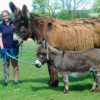
All donkeys great and small find their sanctuary in Devon
A group of seven donkeys comprising of one of the largest breeds, and one of the smallest, have been relinquished into the care of The Donkey Sanctuary in Devon.
Due to a change in their owner’s circumstances, the three large Poitou donkeys, and four Mediterranean Miniature donkeys were taken into the care of the international animal welfare charity and will now have a home for life at its sanctuary in Sidmouth.
Poitou donkeys measure an average of 14.2 hands high (142-152 cm). They are distinctive not just because of their size, but also from their long shaggy coats and are not usually found alongside Miniature donkeys, who are on average eight hands tall, reaching no more than 91cm at the shoulder.
On their first visit to meet the donkeys at their home, it was clear to The Donkey Sanctuary’s Donkey Welfare Advisers, Tewsday Herbert and Sophie Foster, that the seven were used to receiving lots of love and attention, and were comfortable being handled.
Tewsday said: “In my role as a Donkey Welfare Adviser, I rarely come across the less common breeds of donkeys, so it was a real treat to meet the Poitous and Miniatures.”
Poitous originate from their regional namesake in west central France. For hundreds of years they were bred solely to be used in mule breeding, an activity that made an important contribution to the French agricultural economy and earned the Poitou a worldwide reputation.
By 1950, there was little demand for the Poitou as the mule could not compete with the tractor and the lorry. This lead to a dramatic decline in the population of the Poitou, and although numbers have increased, they are still relatively rare today.
Miniature Mediterranean donkeys, more commonly known as miniature donkeys, are a separate breed in their own right, originally hailing from the islands of Sardinia and Sicily. Miniature donkeys were traditionally used to turn grinding stones for grain inside houses on the Mediterranean islands. They would also carry water from village wells, and take supplies into the mountains for shepherds.
The donkeys are not suitable for rehoming due to their specialist care requirements, and it was deemed in their best interest to bring them to the sanctuary in Devon, where they now have a home for life.
Tewsday added: “It is very important that we gain as much information about the donkeys before they come into our care, particularly of those on medication or with ongoing health issues.
“Some of the donkeys were on long-term medication to help keep them healthy in their older age.
“The group had clearly be well cared for and were from a loving home, and I am so glad we are able to give these donkeys a home for life after their owner reached out to us. They deserve a secure future getting the attention they need.”
The Donkey Sanctuary’s dedicated Welfare team is still responding to urgent welfare concerns and remains committed to supporting donkeys and their owners throughout this difficult time.
To find out more information and to contact the Welfare team, please visit the charity’s website.














